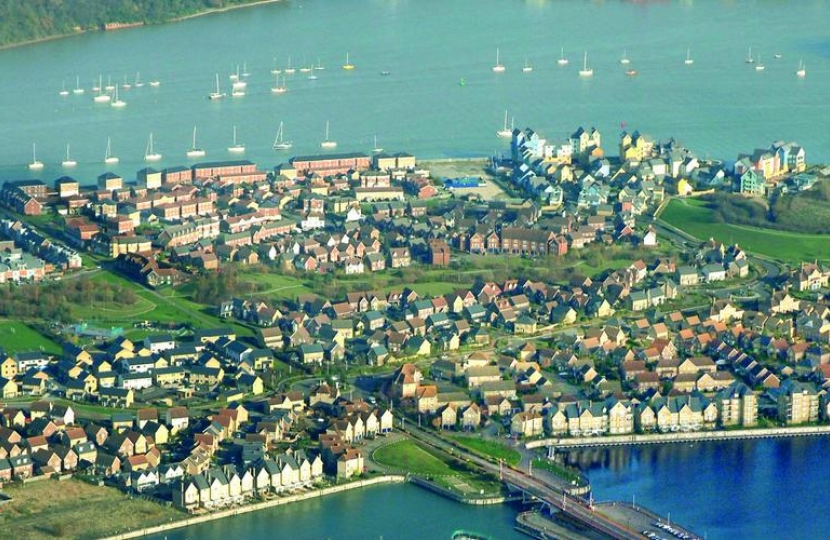
Rochester and Strood MP Kelly Tolhurst has been in contact with Medway Council regarding concerns about local air quality.
In her letter to the Director of Frontline Services, Kelly reiterated the worry that many constituents have about impact of air pollution on residents’ health and the need for Medway to meet its environmental commitments. She also asked for an update on the council’s strategy to improve air quality, and raised her specific concerns about the effect that unsustainable housing developments will have.
The Council has responded, giving further information regarding air quality monitoring and reduction, and has given assurances that the concentration of dangerous particulate matter is falling.
Their response can be read below. Kelly has committed to engaging further to see what more can be done to tackle emissions in the constituency.
"Dear Kelly Tolhurst MP,
Thank you for your letter dated 5 February 2020, regarding Medway Council’s position on tackling air pollution in the district.
My department has been asked to respond to you on behalf of Ruth DuLieu.
The following reports have been released in recent weeks - The Centre for Cities report which was published on 27 January 2020 and The British Heart Foundation ‘Progress towards cleaner air and why we need to do more’ which was published on 4 February 2020 .
Medway is committed to improving the air quality for its residents and future generations, and this was reinforced by the declaration of a ‘Climate Change Emergency Motion’ by Full Council in April 2019.
In Medway, we operate two air quality monitoring stations, both are part of Defra’s automatic urban rural network (AURN) – a system of key locations across the country that inform the national picture for air quality. We monitor PM2.5 at both of these sites; Chatham Grammar School for Girls and Stoke Primary Academy. Until relatively recently Medway was the only authority in Kent which measured PM2.5, hence there was no data for any other Kent authority for Medway to be compared against. It is also important to note, that the other site in Kent is not part of the national monitoring network and therefore it will not appear in these types of report.
There will be many more towns and cities across the UK, including those in Kent, that will be above the WHO guidelines, but because there is no monitoring carried out they were not highlighted in the Centre for Cities report. These areas also do not necessarily get picked up by the Defra modelling. It is therefore misleading to compare Chatham with other areas of the UK in the absence of comprehensive data. However, the British Heart Foundation report (attached) includes a heat map on page 9 which shows the extent of the area of England that is modelled to have background levels close to or above the WHO guidelines for PM2.5. This demonstrates that it is not just a towns/cities issue, as background PM2.5 is elevated across the whole of the southeast region, it is important to note that this is not just an issue which affects Medway.
In addition, in its FAQ section, the WHO website gives the following caveat and guidance on interpreting and comparing data from their website:
Unfortunately, many cities in the world, including some expected to be among the most polluted, do not collect information or report on outdoor air quality. WHO therefore cannot compare cities based on their levels of outdoor air pollution.
Rather, WHO has brought together information on ambient air pollution collected by cities and towns worldwide in order to raise awareness and facilitate adequate responses to protect public health from the adverse impacts of outdoor air pollution.
Cities that collect and disseminate information on outdoor air quality need to be praised for their action. This is the first crucial step to identify if there is an outdoor air pollution problem and to begin to take corrective action. The cities which have invested in the capacity to regularly monitor and report local air quality measurements have already demonstrated a commitment to begin the process of addressing air quality issues and public health’.
Medway’s monitoring data shows that background levels of PM2.5 away from busy roads and population centres are already at the WHO guideline levels, with levels at our roadside urban monitoring site in Chatham being slightly higher. The data presented in the Centre for Cities report is for 2018, and therefore does not reflect the improvement in PM2.5 levels measured at the site in 2019. The graphs below show the trends for PM2.5, PM10 and nitrogen dioxide at both of the air quality stations since 2009. As you can see there is a general downward trend.



One particular issue for the Kent region is imported air pollution, that when combined with local sources results in elevated pollution levels in urban areas. Areas of Kent will not only receive pollution from mainland Europe, but London has been known to contribute to levels in the county.
Medway currently has four Air Quality Management Areas, declared for exceedance of the annual mean objective for nitrogen dioxide, a pollutant present in vehicle exhaust emissions. Reducing road transport emissions within the Air Quality Management Areas, and the wider area, is therefore a key air quality priority for Medway in terms of working towards achievement of the air quality objectives.
The Medway Air Quality Action Plan (AQAP) was adopted in 2015 and has been established to ensure the Council is able to monitor progress and, through a partnership approach, address any issues around air quality locally. The action plan has a particular focus on reducing nitrogen dioxide, but also contributes to reducing other pollutants including particulate matter.
There key measures in the AQAP are:
- Improve freight management (e.g. lorries)
- Encourage the increased use of public transport
- Improving taxi emissions
- Traffic management
- Promotion of cycling walking
- Eco driving (driving in a smooth, controlled way reduces fuel use and air pollution)
- Procurement (work to ensure that services procured by the Council also support good air quality)
- Travel planning (e.g. supporting school travel plans)
- Promote health awareness and air quality issues
- Feasibility studies to tackle specific local issues
- Development planning
- Development of an Air Quality Communications Strategy
- Working with the Planning Authority to embed air quality guidance into the new Local Plan
Some good progress has been achieved since the action plan has been adopted and progress is reported annually to DEFRA in the Annual Status Report (ASR). The current ASR can be found at the following link https://www.medway.gov.uk/downloads/file/3052/air_quality_annual_status_report_2018.
The following key measures have been undertaken as part of the action plan to help improve the air quality in Medway and support new developments coming forward:
- Air Quality Planning Guidance has been developed and implemented across Medway. This ensures that air quality impacts of developments are considered and mitigated. We have guidance for developers which reminds them of their responsibility to help improve local air quality through appropriate processes, such as installing charging points for electric vehicles and planting hedgerows and trees.
- The council promotes walking and cycling initiatives such as ‘Walk on Wednesday’, school crossing patrol service, Medway Big Ride, Medway Healthy Walks and the walking bus for schools etc.
- Promoting the use of public transport, including working with bus operators to ensure that the bus fleets are clean in respect to air pollution and the taxi community. The council were involved in an electric bus trial with a local operator last year.
- The council has actively promoted the Kent and Medway Journey Share scheme and the free Air Pollution Forecast.
- The Council’s Environmental Protection team and Public Health department have collaborated to develop an air quality communications strategy. The aim of this strategy is to engage with residents, businesses and other stakeholders to get them to tackle the things that cause air pollution. As part of the communication strategy we have been working with schools across Medway as part of the KM Green School Awards to raise awareness of air pollution and what they can do to improve it within their school community, part of the project has been to undertake an air quality monitoring project using diffusion tubes. We are currently working with 13 schools across Medway (primary and secondary schools). Unfortunately no schools on the Peninsula have taken up this opportunity (it was offered to all schools in Medway) It would be really positive in the schools you have identified were to get involved in this programme.
In respect to your comments you have made regarding the development which is planned for Medway and the impact it will have on the local air quality. I can confirm as part of the Local Plan work the air quality impacts of the proposed developments will also be modelled. The Environmental Protection team will be reviewing this work and will be ensuring that the new Local Plan, which is currently being developed, will have a strong air quality policy, which will be supported by the requirements of the Medway Air Quality Planning Guidance.
Tackling climate change is a priority for Medway Council and as such a climate emergency was declared in April 2019. We have engaged with Kent County Council on an emerging Kent and Medway Energy and Low Emissions Strategy and are currently developing a 5 year rolling action plan. A cross party Member Advisory Board has been set up to oversee progress. You can find out more about the work that we are doing to tackle climate change at www.medway.gov.uk/climatechange"




